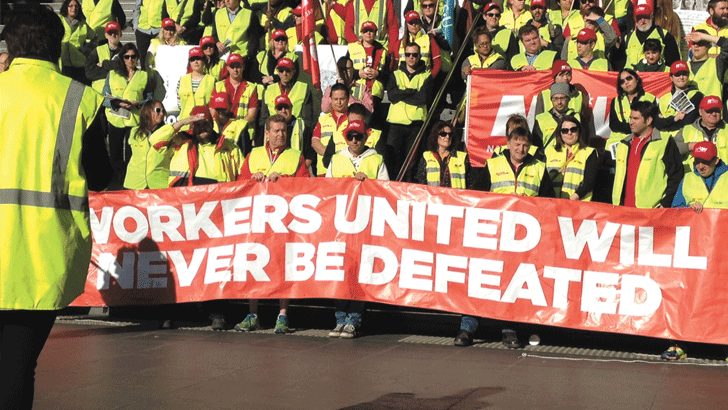Liberals on the attack

The first parliamentary sitting week of the Abbott government proceeded with the usual pomp and ceremony. Inaugural speeches were made, Gina Rinehart flew her personal jet to Canberra to watch the proceedings from the observers’ gallery, and Maurice Newman gave the government some advice.
Newman, a former investment banker and head of the Australian Securities Exchange, is the chair of Abbott’s newly convened Business Advisory Council. He played a key role in establishing the conservative think tank the Centre for Independent Studies.
Speaking at a business dinner for the Committee for Economic Development Australia (CEDA) on 11 November, Newman warned of Australia’s “deteriorating economic situation” and advocated a raft of attacks on Australian workers.
First in his sights is lowering the minimum wage. In Newman’s opinion, workers have had it too good for too long: $16 per hour is a fetter on the competitiveness of Australian capital.
He compared it with the paltry minimum wages in austerity Europe, and the United States’ federal minimum of $US7.25 per hour, to make his case.
“While any discussion in Australia about industrial relations evokes screams of outrage and the spectre of WorkChoices”, he said, “we cannot hide from the fact that … our system is dogged by rigidities.”
By “rigidities” Newman means entitlements that have been won through decades of struggle. He bemoaned the fact that “on top of our minimum awards, Australian employers must pay 10 percent of their payroll in workers’ compensation insurance premiums, a 9.25 per cent compulsory superannuation surcharge, sick leave, overtime penalty rates and holiday loadings”.
Of course Newman’s recommendation to slash wages and conditions would have gone down a treat with the corporate scum who attend such business dinners. One imagines them quaffing their champagne and exclaiming enthusiastically, “Jolly good stuff this; pay them less and end the age of entitlement! By god, he makes a good point.”
Yet as dawn broke over the crates of empty bottles outside the Four Seasons Hotel in Sydney, scene of the CEDA dinner, the Australian Council of Social Services was preparing to release the results of its annual Poverty in Australia report.
The report shows exactly how well low-income workers have it in Australia today. Of the more than 2 million people now living in poverty, 62 percent live in households dependent on meagre social security payments.
Twenty-nine percent are in households with wages as the main income source. Child poverty has increased to 17.6 percent. And with single parents suffering the fifth highest rates of poverty of all OECD countries, Australia is well on track to match the conditions in the lower wage economies that inspire Maurice Newman’s grand plan to create a “more business-friendly environment”.
In the lead-up to the federal election, Abbott went out of his way to rubbish any notion of fast and furious cuts from a Liberal government. It is clear, however, that the Liberals have no intention of disappointing Newman or any of their backers in the business class.
Even before parliament had opened, the Abbott government had declared an economic offensive against workers. The warning shot came with the statement that the low income super contribution rebate – worth a measly $500 a year for those earning less than $37,000 – will be scrapped in favour of increased tax breaks for the 16,000 people with more than $2 million in superannuation.
Also high on Abbott’s to-do list is the passing of new, toxic, anti-union laws. On the second sitting day of parliament, the government introduced a bill to reinstate the Australian Building and Construction Commission (ABCC).
The ABCC will police both onshore and offshore building sites and will be headed by tyrants of old, former ABCC heads John Lloyd and Nigel Hadgkiss. These two union-bashers infamously presided over a failed attempt to have unionist Ark Tribe jailed for refusing to attend one of the ABCC’s interrogations.
The laws to reinstate the ABCC were accompanied by employment minister Eric Abetz’s Registered Organisations Bill, which will expose unions to a raft of criminal charges and higher potential fines for doing their job.
The economic offensive against workers also comes with a political offensive. Attorney-General George Brandis announced that sections of the Racial Discrimination Act that make it an offence to insult another person on the basis of their ethnicity or race will be repealed.
Immigration minister Scott Morrison spent the week constructing an iron wall of silence on deteriorating conditions for the more than one thousand refugees languishing on Nauru and Manus Island.
Behind this wall, Morrison’s department meted out more torture to refugees, deporting a planeload of unaccompanied minors to Sri Lanka and separating a woman refugee detained in Brisbane from her newborn baby.
The government has also quashed any idea that it will attempt to reduce carbon emissions even by the measly promised target of 5 percent by 2020.
Abbott wants his big business cronies to rest safe in the knowledge that he intends to carry out their agenda. For the rest of us, the message is that the anti-worker arch-conservative flat-earthers are ascendant, and they won’t be hindered in their attacks by any consideration of liberal values.
By the end of the first week of the new parliament, Abbott had drawn the battle lines for the war on workers to come and confirmed the meaning of his portentous election night declaration that “Australia is open for business”.